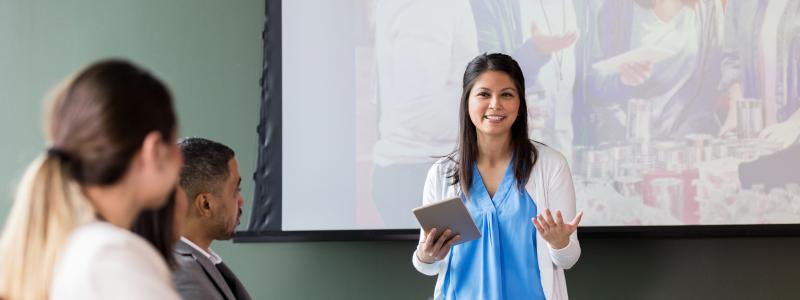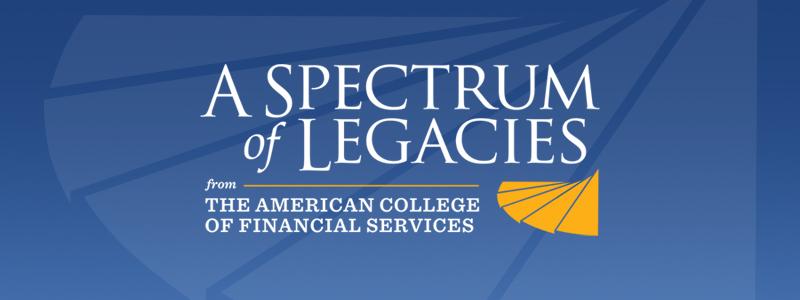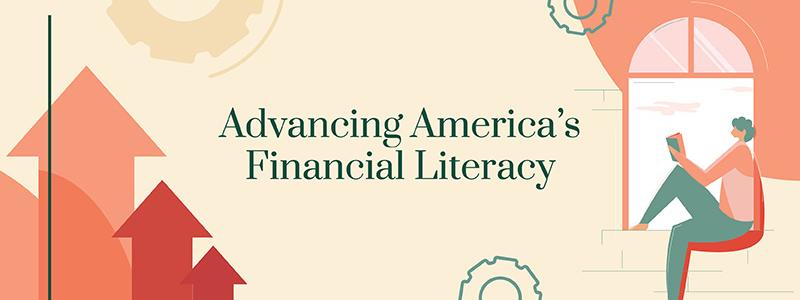Purpose School: Your Invitation to a Community for Growth and Impact

Over the past year and a half, people across the country and the world have come together in unprecedented ways to meet the challenges we face with innovative solutions that lay the groundwork for long-term, transformative change. I’m fortunate to work for an institution in the midst of many of the most important of these changes, and one whose faculty, staff, and network of supporters are dedicated to pushing them forward. That’s why I’m proud to announce the next step in our mission to promote lifelong learning and the benefit of society: Purpose School from The American College of Financial Services.
Purpose School is a new state-of-the-art social impact experience designed for those who wish to refresh, deepen, or more significantly repurpose their energies, and discover new ways to make a difference in their lives, and the lives of others.
The program offers the space and support to learn from experts, explore your own purpose, and connect with and enjoy others. Our conversations include innovations in philanthropy but also impact investing and social enterprise, along with deep dives into practice areas such as human-centered design. This is all tied together by our new PS 360 Notebook and activities, which help frame personal reflections throughout, and is capped with a personal passion project. Purpose School Fellows are entrepreneurs with a growth mindset looking to update their skills and join a special community of change-makers, mid-career professionals considering a focus on greater impact, and late-career leaders approaching or in a career transition, with more time and resources to devote to renewed purpose.
The Founders Class is a special opportunity and one especially well timed given the needs all around us. We’re excited about having a dynamic and inspired first class and I sincerely hope that you’ll consider joining as a Fellow.
It is time to match the challenges we face today with a new urgency and ambition for making a difference. That potential is what Purpose School is built for — to discover new possibilities, know-how, meaning and joy in giving back. I invite you to be a part of the Founders Class and my own journey for change.
I can’t wait to get to know the faces and hear the stories of our fellow purpose-driven individuals. Let’s work together to realize that new day and remind everyone, no matter where they may be, that we are, as always, “stronger together.”
A New Resource for a Growing and Caring Community

Studies have indicated 7% of all children have some sort of developmental disability. 26% of U.S. adults are classified as living with special needs or a disability. And yet despite these growing numbers, one is still distressingly low: one-third of caregivers for those with special needs aren’t planning for their own futures right now. Without a sound financial plan to assure their security later in life and to ensure their loved ones and dependents have the care they need, caregivers are sacrificing their own quality of life for a goal that eludes their grasp. These dedicated individuals shouldn’t have to choose between themselves and their loved ones with special needs.
That’s why I’m proud to announce the launch of a new website for the American College Center for Special Needs, which will serve as a headquarters for The College’s professionals and networks to better address the needs of caregiver clients and finally help them achieve the peace of mind they deserve.
Established in 2014 by a transformative gift from MassMutual, the Center for Special Needs seeks to be the nation’s leading voice on financial planning for professionals working with the loved ones, guardians, and caregivers of those with special needs. Supported by world-class thought leadership, programming, and education focused on the underserved but rapidly growing special needs community—including The College’s own Chartered Special Needs Consultant® (ChSNC®) professional designation—the Center is uniquely positioned to deliver a massive benefit to society and these communities.
I couldn’t be more proud to share this exciting news, and I invite you to visit the new Center website as we continue to shine a light on the Center’s work and its synergy with the only financial services designation that provides comprehensive education in special needs planning. We remain steadfast in our commitment to the special needs community, caregiver clients and loved ones alike, and hope you’ll join us in making the relaunch of this Center website a success.
Critical Research Enables Our First Step Forward

Black women's influence on their families and within their communities is undeniable. Yet, they remain an underserved demographic in the financial services industry. Our first step forward focuses on developing programs that curate the best financial knowledge relevant to Black women to grow their wealth. The more Black women know about the barriers to financial stability, savings strategies, investing, and transferring wealth, the more their families and communities can grow in financial wisdom.
To this end, I'm proud to present the Center for Economic Empowerment and Equality's inaugural research study, Black Women, Trust, and the Financial Services Industry. We surveyed 3,500 middle-income Black women across the nation to create a holistic picture of Black women's perception of financial services and money, their wants and needs, and their role as decision-makers in their households and communities.
With this groundbreaking research, we now have actionable insights that The College plans to use as we work to improve Black Americans' relationship with money and the financial services industry. The Center for Economic Empowerment and Equality is dedicated to bringing Black women into the fold, starting with showing the financial services industry the opportunities available to better connect with Black women and better demonstrate inclusivity, empathy, and understanding.
I invite you to view the research and learn what's needed to become better partners and financial allies with Black women. You, too, can help us in our mission to close the wealth gap.
Uncover the Meaning Behind Wealth with A Spectrum of Legacies

I was introduced to legacy planning when I read a book by an alumnus of The College's Chartered Advisor in Philanthropy® (CAP®) program, Mark Weber, CAP®. The book, The Legacy Spectrum: Passing Your Wealth With Thought And Meaning, compelled me to think beyond estate planning regarding our legacy. My wife, CJ, and I were introduced to activities that enabled us to have more profound, more meaningful conversations with our adult children on the subject.
Mark's insights and process left a mark on us. So much so that I felt compelled to bring Mark's unique approach to life through The College's technology platform and instructional design capabilities and made a personal commitment to achieving this end.
I'm excited to share that A Spectrum of Legacies is here and available to all - financial professionals and consumers alike!
This free consumer philanthropic education program serves many purposes. First, it helps you strengthen family ties and prepare your children to receive wealth. Next, it facilitates an exploration of incorporating philanthropy into your legacy planning to pass your values to your children and make a lasting difference in the lives of others.
I hope that many will participate in this program, uncovering a deeper meaning for their wealth and a new purpose for their wealth to be shared, positively impacting the future of their families and others. I invite you to enroll in A Spectrum of Legacies, share it with your families, and then introduce it to your clients!
Is Your Culture Ready for DE&I Progress?

While the strides I mentioned above are significant, there’s another question we need to be asking in board rooms across America: "Is our culture changing in tandem with our efforts?" Without a resounding "Yes," we’re at risk of reverting over time to the status quo.
It's natural to want to celebrate progress, yet we need to be realistic about the stages of organizational transformation. Actual change takes months and often years. After all, DEI programs are not new; they date back to the 1960s, when workplace diversity training first emerged. And here we are, 60 years later, still just beginning to address race and gender leadership inequities in corporate America.
Triggering events spur new visions, yet converting fully to a new reality often falls short. Only through applying many lenses to our efforts, dedicating resources, and setting measurable goals can we reinforce and sustain meaningful change.
As we approach a new year, reflect on the past, and forge ahead with our DEI planning, I hope you will evaluate your own efforts in terms of actual cultural change. Were recent appointments of people of color and women made in tandem with developing new programs and pathways for continued leadership advancement, or were they long-overdue promotions given as a reactionary response to social unrest? What new DEI goals exist for your organization in 2022? How will you measure success and stay accountable for continued cultural change?
The College remains committed to helping drive transformational change in the financial services industry through research and program development. We look forward to another year of profound progress with those organizations committed to creating sustainably diverse, equitable, and inclusive cultures.
Gratitude and Grief

However, my gratitude is a companion to grief. Grief over the loss of life and destruction of so many places engrained deep in childhood memories across the western part of the state. As I've explored these emotions over the past several days, I've learned that when gratitude accompanies grief, we have the resilience to overcome life's unexpected misfortunes. It is in the crossing of gratitude and grief where compassion lives.
Francis Well, a well-known author and psychotherapist, has said, "The work of the mature person is to carry grief in one hand and gratitude in the other and to be stretched large by them. How much sorrow can I hold? That's how much gratitude I can give. If I carry only grief, I'll bend toward cynicism and despair. If I have only gratitude, I'll become saccharine and won't develop much compassion for other people's suffering. Grief keeps the heart fluid and soft, which helps make compassion possible."
As stories from the survivors continue to emerge, gratitude is pervasive. If you watch the interviews of people standing in front of their destroyed homes, you'll hear, "I'm lucky I'm still alive" or "Thank God, I was not home when the tree went through my house."
The texts from my niece are the same, filled with gratitude even at not having power restored until all the missing people in her neighborhood were found. "I just wanted to let everyone know my power is restored. I can come back home, but I want to say, God knows what's best for us all! He knew "mentally" I couldn't come home every day riding past the area where people were still missing. The last little girl was found yesterday near the creek by my house. I don't always understand his ways, but I have to trust HIM!"
As Bowling Green and other communities contend with what they have lost over the days, weeks and months ahead, grief balanced with gratitude will sustain them and enable them to look ahead to the future.
My intense feelings of gratitude extend to you this holiday season. I wish you a healthy, happy, and safe holiday with those you hold dear! Thank you for your continued support of The College, our mission, and our vision.
Here is a link to the Team Western Kentucky Tornado Relief Fund for those looking for a way to help those impacted by the tornadoes.
Our New Year's Call to Action
Our call to action remains to deliver relevant programming and thought leadership on which financial professionals can build and maintain trust with their clients.
And as a new day approaches, we will guide an industry forward to create new and lasting relationships with communities too long left underserved for the benefit of all society.
Watch my two-minute video eagerly anticipating the opportunities and possibilities ahead.
Happy New Year!
The Critical Role of Sponsorship in the Pursuit of Economic Justice

Dr. King relied on his mentors to help him identify opportunities for growth in his strategy and guidance in advancing the civil rights movement. One of them was Ralph Bunche, an American political scientist, diplomat, and the first African American to receive the Nobel Peace Prize for arranging a cease-fire between Israelis and Arabs in the Palestine conflict. Bunche advised Dr. King to work hard toward actionable steps, avoid being too critical and always in the public's eye, and welcome disparate views before making a final decision.
Different times may call for different measures. Bunche's advice to Dr. King to "lay low" may not be what he would advise today, yet his wisdom was invaluable and based on his experience in Washington. Having the advice of those who have gone before is critical in navigating unknown territory.
For Black mid-level executives, the unknown territory is the senior level of financial services organizations. The ability to be introduced to and build connections with senior executives is significant to those pursuing career advancement. Yet how do you advance if you cannot connect with those who have successfully gone before?
Implicit racial bias embedded deep within organizations has too often obstructed the ability for Black professionals to gain access to the highest levels within organizations. Black executives have not benefited from advocates vouching for their value, contributions, and promise, nor have they been able to form the relationships needed to glean insights for maneuvering organizational politics. Both serve as catalysts for promotion–and this is where mentorship shows its limits.
Mentorship is needed for advice; sponsorship is needed for advancement. Sponsors invest much deeper in relationships with their proteges by consistently guiding their professional development and advocating for their success.
In March, the Center for Economic Empowerment and Equality will conduct its first Black Executive Leadership Program, with a primary purpose of advocating for the success of the mid-level executives who will make up the program's fellows. The program's success relies heavily on a commitment from senior-level executives, serving as sponsors, to assist in the fellows' professional development and advocate for their advancement. The program helps build long-lasting relationships that will work to advance Black professionals and expand the perspectives of senior-level executives.
I look forward to sharing more about the Black Executive Leadership Program in the months ahead. Together, we can turn Dr. King’s dream of social and economic justice for Black Americans into reality.
Five Critical Considerations to Advance Financial Literacy

Like many challenges facing society, a silver bullet solution to remedy America’s lack of financial knowledge doesn’t exist. Instead, a multi-pronged approach deployed on multiple fronts is needed to tackle the issue. As the preeminent leader in applied financial knowledge and education, The American College of Financial Services has always been committed to benefiting the financial well-being of society.
Since 1927, we’ve recognized that knowledgeable professionals best serve the public’s financial security. Today, we also acknowledge that consumers need increased financial knowledge to pursue advanced expertise and the services and products required for financial stability and wealth building.
In 2021, the American College Center for Economic Empowerment and Equality started executing a bold plan to close the wealth gap for all underserved communities, including Black, Hispanic, Asian and those living in rural America. The Center’s progress with Four Steps Forward has been steadfast. We’ve conducted critical research and developed innovative programs, including Know Yourself, Grow Your Wealth, an e-learning consumer financial education and empowerment program distributed in partnership with the Society for Financial Education and Professional Development, Inc. (SFE&PD).
As we continue to progress in our work, I’d like to share five critical considerations to help inform and shape other initiatives focused on increasing the financial well-being of Americans.
1. Economic Well-Being Requires Trust
Improving the financial well-being of underserved communities requires growth in financial knowledge and TRUST. Focusing on increasing financial knowledge without addressing distrust in financial services will only continue the cycle of poor financial engagement, which is necessary for increased financial stability and wealth building.
2. Evidence-Based versus Idea-Based Solution Development
There is no shortage of good ideas formed based on goodwill. Yet, good intentions are not enough to create lasting change. Research must inform solution development, ensuring the development of practical and effective solutions.
Before the financial services industry devises the services and products to connect with new demographics, they must first understand the needs and wants of these communities and where gaps exist.
The Center for Economic Empowerment and Equality released the Black Women, Trust, and Financial Services study in 2021 to inform the financial services industry of what is needed to build an advisory relationship with Black women. Research across The College continues to focus on delivering critical data for evidence-based solution development.
3. Education Rooted in Cultural Relevance and Context
America is a vast tapestry of cultures that shape our unique experiences and perspectives. For financial education to be relevant, it needs to be applied through a cultural lens, valuing the strength in difference and layered in context to bring greater meaning to students. Know Yourself, Grow Your Wealth was developed by applying the culturally specific lens of Black America and layered in context for young earners, those about to embark on their careers, and who want to learn how to make better financial decisions.
4. “That’s Me!” in Financial Services
Have you seen the videos of the young children watching some of the more recent Disney movies, turning to their parents, proclaiming, “That’s me!” Well, “That’s me!” is also needed in financial services. As people grow in financial knowledge and seek additional expertise, they will look to identify with those who best understand their wants, needs, and concerns—those who see the world through the same cultural lens they do. Increased representation in financial services will increase financial stability for all Americans.
5. Casting a Wider Net through Partnership
Your distribution model dictates demand for any new product, service, or solution. In January, Know Yourself Grow Your Wealth, developed in partnership with SFE&PD, launched at over twenty HBCUs with seventy student ambassadors who have completed the program and are actively enrolling participants on college campuses.
Know Yourself Grow Your Wealth continues to attract the interest of corporate sponsors looking to grow in diversity, along with colleges and universities eager for a solution to address the need for increased financial education on their campuses and in their communities. As we continue to develop much-needed consumer financial education programs, partnerships are critical to cast a wider net.
I invite you to learn more about Know Yourself, Grow Your Wealth and look forward to sharing updates as the Center for Economic Empowerment and Equality progresses in its work to increase financial literacy in underserved communities across the country.